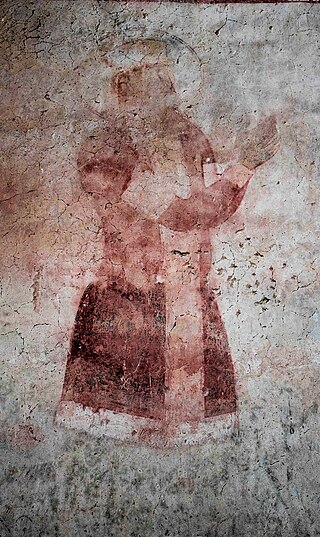
Hulegu Khan, also known as Hülegü or Hulagu, was a Mongol ruler who conquered much of Western Asia. Son of Tolui and the Keraite princess Sorghaghtani Beki, he was a grandson of Genghis Khan and brother of Ariq Böke, Möngke Khan, and Kublai Khan.

Hethum I ruled the Armenian Kingdom of Cilicia from 1226 to 1270. He was the son of Constantine of Baberon and Princess Alix Pahlavouni of Lampron and was the founder of the dynasty which bears his name: the Hethumids also known as the House of Lampron. Having accepted the suzerainty of the Mongol Empire, Hethum himself traveled to the Mongol court in Karakorum, Mongolia, a famous account of which is given by Hethum's companion, the historian Kirakos Gandzaketsi, in his History of Armenia. He allied with the Mongols to fight against the Muslim Mamluks and also encouraged other Crusader states to do the same.
Baiju Noyan or Baichu was a Mongol commander in Persia, Armenia, Anatolia and Georgia. He was appointed by Ögedei Khan to succeed Chormagan. He was the last direct imperial governor of the Mongol Near East; after his death Hulagu's descendants inherited domains he once commanded.
EljigideiNoyan was a Mongol commander in Persia.

Möngke Khan was the fourth khagan of the Mongol Empire, ruling from 1 July 1251, to 11 August 1259. He was the first Khagan from the Toluid line, and made significant reforms to improve the administration of the Empire during his reign. Under Möngke, the Mongols conquered Iraq and Syria as well as the kingdom of Dali.
Gegeen Khan, born Shidibala, also known by his temple name as the Emperor Yingzong of Yuan, was an emperor of the Yuan dynasty of China. Apart from Emperor of China, he is regarded as the ninth Great Khan of the Mongol Empire, although it was only nominal due to the division of the empire. His personal name "Shidibala" in Sanskrit means "purity protection" and his regnal name "Gegeen Khan" means "enlightened/bright khan" in the Mongolian language.
Kitbuqa Noyan, also spelled Kitbogha, Kitboga, or Ketbugha, was an Eastern Christian of the Naimans, a group that was subservient to the Mongol Empire. He was a lieutenant and confidant of the Mongol Ilkhan Hulagu, assisting him in his conquests in the Middle East including the sack of Baghdad in 1258. When Hulagu took the bulk of his forces back with him to attend a ceremony in Mongolia, Kitbuqa was left in control of Syria, and was responsible for further Mongol raids southwards towards the Mamluk Sultanate based in Cairo. He was killed in 1260 at the Battle of Ain Jalut, which was the first major loss of the Mongolian advances and halted their expansion into Arabia and Europe.

David VII, also known as David Ulugh (1215–1270), from the Bagrationi dynasty, was king (mepe) of Georgia from 1246 to 1270. He first ruled Georgia jointly with his namesake cousin, David VI, from 1246 to 1259. From 1259, David VI, revolting from the Mongol hegemony, seceded in the western half of the kingdom and formed the Kingdom of Western Georgia, while David VII was left to rule a reduced Kingdom of Georgia (1256–1329) in the region of eastern Georgia under Mongol control.
Noyan, or Toyon, was a Central Asian title of authority which was used to refer to civil-military leaders of noble ancestry in the Central Asian Khanates with origins in Noyon, which was used as a title of authority in the Chagatai Khanate of the Mongol Empire. In modern times, Noyan is used as a given name or surname in Asia meaning "the lord", "the prince", "the protector", "the commander-in-chief".

Muqali, also spelt Mukhali and Mukhulai, was a Mongol general who became a trusted and esteemed commander under Genghis Khan. The son of Gü'ün U'a, a Jalair leader who had sworn fealty to the Mongols, he became known by his epithet "Muqali", "one who dulls", earned through his committed and able service to the Great Khan and the Mongol Empire.

The Mongolian nobility arose between the 10th and 12th centuries, became prominent in the 13th century, and essentially governed Mongolia until the early 20th century.

The Qing dynasty of China ruled over the Mongolian Plateau, including Inner Mongolia and Outer Mongolia. Both regions, however, were separately administered within the empire.
Negudar was a Mongol general under Berke, and a Golden Horde Noyan. With many other Golden Horde generals, he embraced Islam in the late 13th century. He subsequently took the Muslim name of Ahmad Khan.
The Qara'unas or Negüderi were the Mongols who settled in Afghanistan after moving from Turkestan and Mongolia.
Aju (1227–1287) was a general and chancellor of the Mongol Empire and the Yuan dynasty. He was from the Jarchud clan of the Mongol Uriankhai. His father was Yuan dynasty general Uriyangkhadai and his grandfather was Subutai, the honored general and Noyan of Genghis Khan.
Buğa or Boğa means "bull" in Mongolian and Turkic languages, also transliterated as Bugha, or Buqa. It may refer to one of the following persons.

Mongol invasions of Anatolia occurred at various times, starting with the campaign of 1241–1243 that culminated in the Battle of Köse Dağ. Real power over Anatolia was exercised by the Mongols after the Seljuks surrendered in 1243 until the fall of the Ilkhanate in 1335. Because the Seljuk sultan rebelled several times, in 1255, the Mongols swept through central and eastern Anatolia. An Ilkhanate garrison was stationed near Ankara. Remains of the Mongol cultural heritage still can be seen in Turkey, including tombs of a Mongol governor and a son of Hulagu.
Chormaqan was one of the most famous generals of the Mongol Empire under Genghis Khan and Ögedei Khan. He was also a member of the keshik.

Yoshmut was an Ilkhanate prince and one of the eldest sons of Hulagu. According to Dai Matsui and Daniel King, his name was of Christian Uyghur origin and ultimately derived from the Sogdian word "ʿywšmbt".








